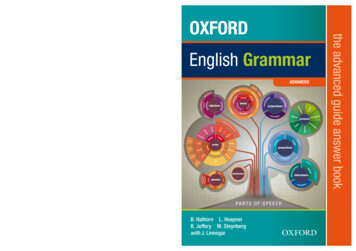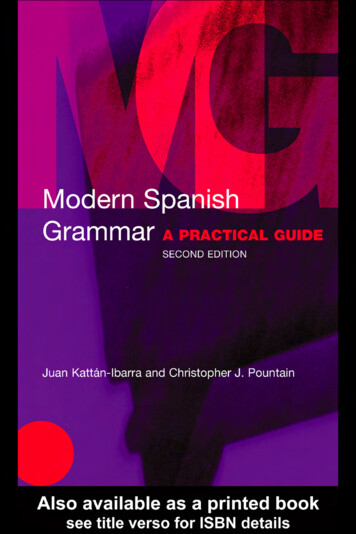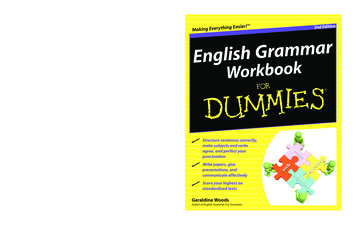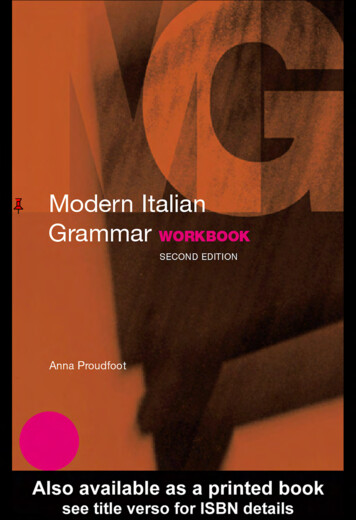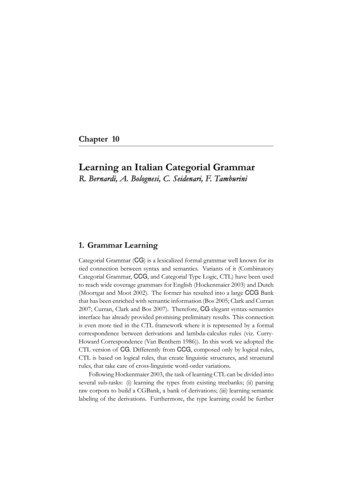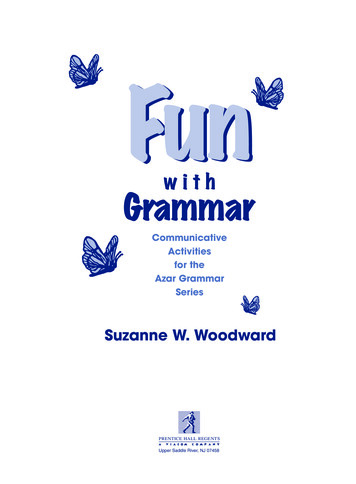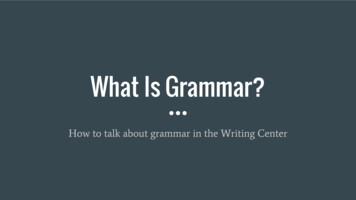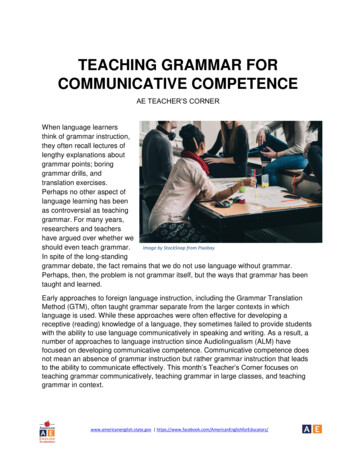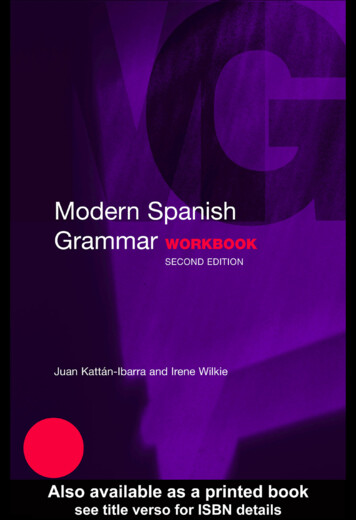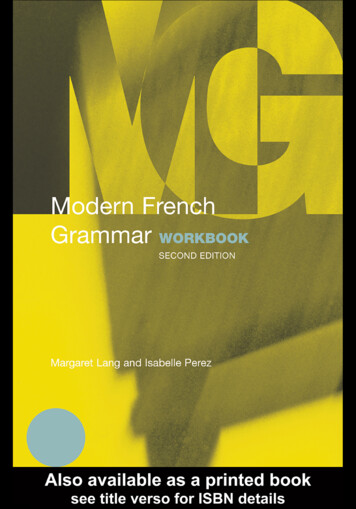
Transcription
Grammar and CompositionGrammar PracticeWorkbookGrade 6
Glencoe/McGraw-HillCopyright The McGraw-Hill Companies, Inc. All rights reserved. Permission isgranted to reproduce material contained herein on the condition that such material bereproduced only for classroom use; and be provided to students, teachers, and familieswithout charge; and be used solely in conjunction with Writer’s Choice. Any otherreproduction, for use or sale, is prohibited without written permission of the publisher.Printed in the United States of America.Send all inquiries to:Glencoe/McGraw-Hill8787 Orion PlaceColumbus, Ohio 43240ISBN 0-07-823352-61 2 3 4 5 6 7 8 9 024 04 03 02 01 00ii
ContentsUnit 8Subjects, Predicates, and Sentences8.1–28.38.48.58.6Unit 9Nouns9.19.29.3Unit 10Using Pronouns Correctly. . . . . . . . . . . . . . . . . . . . . . . . . . . . . . . . . . . . . . . 16Pronouns and Antecedents . . . . . . . . . . . . . . . . . . . . . . . . . . . . . . . . . . . . . . 17Possessive Pronouns . . . . . . . . . . . . . . . . . . . . . . . . . . . . . . . . . . . . . . . . . . . 18Indefinite Pronouns . . . . . . . . . . . . . . . . . . . . . . . . . . . . . . . . . . . . . . . . . . . 19Adjectives12.112.212.3Unit 13Action Verbs and Direct Objects. . . . . . . . . . . . . . . . . . . . . . . . . . . . . . . . . . . 9Indirect Objects. . . . . . . . . . . . . . . . . . . . . . . . . . . . . . . . . . . . . . . . . . . . . . . 10Present, Past, and Future Tenses . . . . . . . . . . . . . . . . . . . . . . . . . . . . . . . . . . 11Main Verbs and Helping Verbs . . . . . . . . . . . . . . . . . . . . . . . . . . . . . . . . . . . 12Present and Past Progressive Forms . . . . . . . . . . . . . . . . . . . . . . . . . . . . . . . 13Perfect Tenses . . . . . . . . . . . . . . . . . . . . . . . . . . . . . . . . . . . . . . . . . . . . . . . . 14Irregular Verbs. . . . . . . . . . . . . . . . . . . . . . . . . . . . . . . . . . . . . . . . . . . . . . . . 15Pronouns11.1–211.311.411.5Unit 12Common and Proper Nouns . . . . . . . . . . . . . . . . . . . . . . . . . . . . . . . . . . . . . 6Singular and Plural Nouns . . . . . . . . . . . . . . . . . . . . . . . . . . . . . . . . . . . . . . . 7Possessive Nouns . . . . . . . . . . . . . . . . . . . . . . . . . . . . . . . . . . . . . . . . . . . . . . . 8Verbs10.110.210.410.510.610.710.8–9Unit 11Sentences and Sentence Fragments. . . . . . . . . . . . . . . . . . . . . . . . . . . . . . . . . 1Subjects and Predicates . . . . . . . . . . . . . . . . . . . . . . . . . . . . . . . . . . . . . . . . . . 2Finding Subjects . . . . . . . . . . . . . . . . . . . . . . . . . . . . . . . . . . . . . . . . . . . . . . . 3Compound Subjects and Compound Predicates . . . . . . . . . . . . . . . . . . . . . . 4Simple, Compound, and Complex Sentences. . . . . . . . . . . . . . . . . . . . . . . . . 5Adjectives and Proper Adjectives . . . . . . . . . . . . . . . . . . . . . . . . . . . . . . . . . 20Articles and Demonstratives . . . . . . . . . . . . . . . . . . . . . . . . . . . . . . . . . . . . . 21Adjectives That Compare . . . . . . . . . . . . . . . . . . . . . . . . . . . . . . . . . . . . . . . 22Adverbs13.113.213.313.413.5Adverbs Modifying Verbs . . . . . . . . . . . . . . . . . . . . . . . . . . . . . . . . . . . . . . . 23Adverbs Modifying Adjectives and Adverbs . . . . . . . . . . . . . . . . . . . . . . . . . 24Adverbs That Compare . . . . . . . . . . . . . . . . . . . . . . . . . . . . . . . . . . . . . . . . . 25Telling Adjectives and Adverbs Apart . . . . . . . . . . . . . . . . . . . . . . . . . . . . . . 26Avoiding Double Negatives. . . . . . . . . . . . . . . . . . . . . . . . . . . . . . . . . . . . . . 27iii
ContentsUnit 14Prepositions, Conjunctions, and Interjections14.1–214.314.414.514.6–7Unit 15Subject-Verb Agreement15.115.215.3Unit 16Capitalizing Sentences, Quotations, and Salutations . . . . . . . . . . . . . . . . . . 37Capitalizing Names and Titles of People . . . . . . . . . . . . . . . . . . . . . . . . . . . 38Capitalizing Names of Places . . . . . . . . . . . . . . . . . . . . . . . . . . . . . . . . . . . . 39Capitalizing Other Proper Nouns and Adjectives . . . . . . . . . . . . . . . . . . . . 9.719.819.9ivUsing Troublesome Words . . . . . . . . . . . . . . . . . . . . . . . . . . . . . . . . . . . . . . 36Capitalization18.118.218.318.4Unit 19Making Subjects and Verbs Agree . . . . . . . . . . . . . . . . . . . . . . . . . . . . . . . . . 33Problems with Locating the Subject . . . . . . . . . . . . . . . . . . . . . . . . . . . . . . . 34Agreement with Compound Subjects. . . . . . . . . . . . . . . . . . . . . . . . . . . . . . 35Glossary of Special Usage Problems16.1–2Unit 18Prepositions and Prepositional Phrases . . . . . . . . . . . . . . . . . . . . . . . . . . . . 28Pronouns After Prepositions. . . . . . . . . . . . . . . . . . . . . . . . . . . . . . . . . . . . . 29Prepositional Phrases as Adjectives and Adverbs . . . . . . . . . . . . . . . . . . . . . 30Telling Prepositions and Adverbs Apart . . . . . . . . . . . . . . . . . . . . . . . . . . . . 31Conjunctions and Interjections . . . . . . . . . . . . . . . . . . . . . . . . . . . . . . . . . . 32Using the Period and Other End Marks . . . . . . . . . . . . . . . . . . . . . . . . . . . . 41Using Commas I-A . . . . . . . . . . . . . . . . . . . . . . . . . . . . . . . . . . . . . . . . . . . . 42Using Commas I-B . . . . . . . . . . . . . . . . . . . . . . . . . . . . . . . . . . . . . . . . . . . . 43Using Commas lI-A . . . . . . . . . . . . . . . . . . . . . . . . . . . . . . . . . . . . . . . . . . . 44Using Commas Il-B. . . . . . . . . . . . . . . . . . . . . . . . . . . . . . . . . . . . . . . . . . . . 45Using Commas Ill-A . . . . . . . . . . . . . . . . . . . . . . . . . . . . . . . . . . . . . . . . . . . 46Using Commas Ill-B . . . . . . . . . . . . . . . . . . . . . . . . . . . . . . . . . . . . . . . . . . . 47Using Semicolons and Colons . . . . . . . . . . . . . . . . . . . . . . . . . . . . . . . . . . . 48Using Quotation Marks and Italics. . . . . . . . . . . . . . . . . . . . . . . . . . . . . . . . 49Using Apostrophes and Hyphens . . . . . . . . . . . . . . . . . . . . . . . . . . . . . . . . . 50Using Abbreviations . . . . . . . . . . . . . . . . . . . . . . . . . . . . . . . . . . . . . . . . . . . 51Writing Numbers . . . . . . . . . . . . . . . . . . . . . . . . . . . . . . . . . . . . . . . . . . . . . 52
Grammar PracticeName . Class . Date .8.1–2Sentences and Sentence FragmentsKey InformationA sentence expresses a complete thought. All sentences begin with a capital letter and endwith a punctuation mark. A declarative sentence tells or states something. It ends witha period. An interrogative sentence asks a question. It ends with a question mark. Anexclamatory sentence expresses a strong feeling. It ends with an exclamation point. Animperative sentence commands someone to do something. It ends with a period.A sentence must have both a subject and a predicate in order to express a completethought. The subject names whom or what the sentence is about. The predicate tellswhat the subject does or what it is like.Dr. Seuss (subject) wrote children’s books. (predicate)A group of words that lacks either a subject, a predicate, or both is called a sentencefragment. Avoid sentence fragments when you write. A. Punctuating Sentences CorrectlyRewrite each sentence, adding capital letters and end punctuation where needed. Thenindicate whether the sentence is declarative, interrogative, exclamatory, or imperative.1. do you know how to blow bubbles2. tell me about your biggest bubbleCopyright The McGraw-Hill Companies, Inc.3. my cousin once blew a bubble as big as a cabbage4. what a great bubble that was B. Forming Complete SentencesCorrect these sentence fragments by adding words to make complete sentences.Remember to start each sentence with a capital letter and end it with the properpunctuation.1. two small dogs2. gave me a present3. she always4. I sometimesWriter’s Choice: Grammar Practice Workbook, Grade 6, Unit 81
Grammar PracticeName . Class . Date .8.3Subjects and PredicatesKey InformationThe complete subject of a sentence includes all the words in the subject.The whole class visited the museum.The complete predicate of a sentence includes all the words in the predicate.The whole class visited the museum.The simple subject is the main word or group of words in the complete subject.The whole class visited the museum.The simple predicate is the main word or group of words in the complete predicate.The whole class visited the museum. A. Identifying Complete Subjects and Complete PredicatesUnderline each complete subject once, and underline each complete predicate twice.1. My cousin visited South America last year.2. She took a boat ride up the Amazon River.3. The Amazon is the largest river in the world.4. The river flows just south of the Equator.5. The weather was hot and humid.7. Over fifteen hundred species of fish live in the Amazon.8. The jungle grows right up to the water’s edge.9. She saw many exotic birds.10. Her favorite was the toucan. B. Identifying Simple Subjects and Simple PredicatesUnderline each simple subject once and each simple predicate twice.1. Her younger brother took lots of photos.2. His favorite photograph shows a giant butterfly.3. He always kept his camera with him.4. Several people asked him about his camera.5. Once, the boat stopped at a small fishing village.6. He got some good pictures of people at work.2Writer’s Choice: Grammar Practice Workbook, Grade 6, Unit 8Copyright The McGraw-Hill Companies, Inc.6. It rained almost every day.
Grammar PracticeName . Class . Date .8.4Finding SubjectsKey InformationUnderstanding word order can help you identify the parts of a sentence. Most statementsbegin with the subject.Jim Henson created the Muppet puppets.Questions can begin with part or all of the predicate, followed by the subject and the rest ofthe predicate.Did Jim Henson create the Muppet puppets?You can find the subject of a question by rearranging the sentence into a statement.Jim Henson did create the Muppet puppets.Statements sometimes present the predicate before the subject.Out of nowhere came the answer.Imperative sentences (requests or commands) usually have an unstated subject. The wordyou is understood to be the subject. A. Rewriting Questions as StatementsRewrite each question as a statement. Underline each simple subject.1. Did Robin Hood really take from the rich and give to the poor?Copyright The McGraw-Hill Companies, Inc.2. Was Sherwood Forest a safe place to hide?3. Were the soldiers able to capture him?4. Did Robin escape? B. Finding SubjectsUnderline each subject. Write (You) before the sentence with an understood subject.1. Tell me another story.2. On the log stood Little John.3. Both men fell into the river.4. Out of the forest galloped the sheriff.5. Was Robin Hood a good leader?Writer’s Choice: Grammar Practice Workbook, Grade 6, Unit 83
Grammar PracticeName . Class . Date .8.5Compound Subjects and Compound PredicatesKey InformationA compound subject has two or more subjects that have the same predicate. The subjectsare joined by the words and or or.Julia and Ramon worked in the bakery.A compound predicate has two or more verbs with the same subject. The verbs are joined bythe words and, or, or but.Juan worked in the store and delivered newspapers.Some sentences have both a compound subject and a compound predicate.Julia and Ramon worked in the bakery but found time for piano lessons. A. Identifying Compound Subjects and Compound PredicatesUnderline the subjects and predicates within each compound subject andcompound predicate. Some sentences contain both a compound subject anda compound predicate.1. Robin Hood and Little John ran from the soldiers.2. Robin started a fire and told this story.3. Robin, John, and Friar Tuck became the best of friends.4. The sheriff called him an outlaw and ordered his arrest.5. In the end, King Richard pardoned Robin, gave him back his land, and made him6. Robin Hood and Little John robbed from the rich and gave to the poor.7. Were the prince and the sheriff greedy?8. Sherwood Forest gave them shelter and provided food. B. Using Compound Subjects and Compound PredicatesImagine that you and your friends were part of Robin’s Merry Men. Write fivesentences about the things you would do on a typical day. Use a compoundsubject, a compound predicate, or both in each of your sentences.4Writer’s Choice: Grammar Practice Workbook, Grade 6, Unit 8Copyright The McGraw-Hill Companies, Inc.a knight.
Grammar PracticeName . Class . Date .8.6Simple, Compound, and Complex SentencesKey InformationA compound sentence contains two or more simple sentences. Each simple sentence in acompound sentence is called a main clause. A clause contains a subject and a predicate.Karen hurried, but Emil walked slowly. (two main clauses joined by a conjunction)A complex sentence has one main clause and one or more subordinate clauses—clausesthat cannot stand alone.Karen hurried because she was late. (main clause and subordinate clause introduced bysubordinating conjunction because.)A run-on sentence is two or more sentences incorrectly written as one. To correct a run-on,write it as two sentences, or join the clauses with a comma and a conjunction. A. Identifying Simple, Compound, and Complex SentencesWrite whether each sentence is simple, compound, or complex.1. George and James stayed at a ranch last summer.2. George liked getting up early, but James slept late.3. George had finished his chores before he ate breakfast.4. They slept in the bunkhouse, which was near the kitchen.5. James rode horses after breakfast; George helped the rancher.Copyright The McGraw-Hill Companies, Inc.6. George brushed the horses each morning and night. B. Correcting Run-on SentencesCorrect the following run-on sentences.1. Maria looked around Laurie ran.2. The school closed for the summer we were happy.3. The bus turned left the car went straight.4. The movie ended we went home.Writer’s Choice: Grammar Practice Workbook, Grade 6, Unit 85
Grammar PracticeName . Class . Date .9.1Common and Proper NounsKey InformationA noun names a person, place, thing, or tysingercountryleafhappinessA common noun is a general name for any person, place, thing, or idea.A proper noun names a particular person, place, thing, or idea. Proper nouns can consist ofmore than one word. You should capitalize the first word and all other important words in aproper noun.Common NounsProper NounspoetWilliam BlakecountryThailandplayRomeo and Juliet A. Identifying NounsUnderline each noun in the sentences that follow. There are one or more nouns ineach sentence.1. Amanda and her cousin collect stamps.3. Amanda has an entire book filled with stamps from America.4. Pen pals send her stamps from their countries.5. Her favorite stamp is from Zimbabwe. B. Identifying Common and Proper NounsWrite whether each of the following words is a common or proper noun. Correct thecapitalization if necessary.1. zoo2. moscow3. river4. julio5. lake michigan6. spaniel6Writer’s Choice: Grammar Practice Workbook, Grade 6, Unit 9Copyright The McGraw-Hill Companies, Inc.2. Her cousin has stamps from almost every country in the world.
Grammar PracticeName . Class . Date .9.2Singular and Plural NounsKey InformationA singular noun names one person, place, thing, or idea. A plural noun names more thanone person, place, thing, or idea.A collective noun names a group of people or things. A collective noun is singular whenthe group acts as a unit. It is plural when each member of the group acts separately.The class goes to the museum. [singular]The class exchange presents with one another. [plural] A. Forming Plural NounsChange each noun in italics to its plural form.1. I wrapped the glass before I opened the box.2. The elf ran after the wolf.3. The chief wanted the knife.4. The army fought over who would get the turkey.5. For some strange reason, he put the tomato next to the vase on top of the radio.6. I keep the rabbit hutch behind the shed.7. Jerry used his camera to take the photo of the church.Copyright The McGraw-Hill Companies, Inc.8. The dancer dropped the mask whenever the band played the waltz. B. Using Collective NounsUnderline each collective noun, and write whether it is singular or plural.1. That class share their essays with one another.2. Our debate team wins top honors every year.3. The new band play one another’s instruments.4. Our family eats dinner at six.5. Joanie’s group outshines the rest.6. Your club has too many members.Writer’s Choice: Grammar Practice Workbook, Grade 6, Unit 97
Grammar PracticeName . Class . Date .9.3Possessive NounsKey InformationA possessive noun names who or what has something.This is grandfather’s watch.I liked the actors’ performances.The children’s room in the library is my favorite.Remember that possessive nouns always contain apostrophes. Plural nouns that are notpossessive do not.Have you seen the pirate’s map? (singular possessive noun)I went aboard the pirates’ ship. (plural possessive noun)I read about the pirates in school. (plural noun) A. Identifying Possessive NounsUnderline the possessive noun in each sentence, and write whether it is singularor plural.1. I looked in the cupboard for the cat’s food.2. What is your brothers’ favorite movie?3. Did you find the boys’ hiding place?4. Today is Ms. Mills’s birthday.5. Are you the group’s new president?Write the possessive form for each word in italics.1. I visited my mother workplace.2. Did you buy the dog food?3. The team new uniforms were blue.4. The surfers boards are on the beach.5. I combed Bess hair carefully.6. José new bike is a ten-speed.7. We watched the soldiers trucks leave.8. Do you still have your cousin phone number?8Writer’s Choice: Grammar Practice Workbook, Grade 6, Unit 9Copyright The McGraw-Hill Companies, Inc. B. Using Singular and Plural Possessives
Grammar PracticeName . Class . Date .10.1Action Verbs and Direct ObjectsKey InformationAn action verb names an action in one or more words.looksreacheswill rememberspeaksuggestA direct object is a noun that receives the action of a verb. It answers the question whomor what after an action verb.We should tip the waiter. [The direct object, waiter, tells us whom we should tip.]Transitive verbs have direct objects. Intransitive verbs do not have direct objects.Maria drives a green sports car. [transitive]Maria drives carefully. [intransitive] A. Identifying Action Verbs and Direct ObjectsUnderline the action verbs once and underline the direct objects twice. Some verbsmay not have a direct object.1. Ginny plays piano in a band.2. Hamsters sleep during the day.3. My parents both work for the same company.4. Jordan explored the reefs for coral.5. I finished dinner before my brother.Copyright The McGraw-Hill Companies, Inc.6. Joanie found a dollar.7. The cat caught the mouse.8. Delores chased the train.9. My parents wrote a note.10. Karen put the book back. B. Writing Sentences with Action Verbs and Direct ObjectsWrite four sentences about things you and your friends often do. Use an action verband a direct object in each sentence.1.2.3.4.Writer’s Choice: Grammar Practice Workbook, Grade 6, Unit 109
Grammar PracticeName . Class . Date .10.2Indirect ObjectsKey InformationIn a sentence with an action verb, an indirect object tells us to whom or for whom an actionwas done.The children sang their parents a new song.In this sentence, the indirect object parents tells to whom the children sang.An indirect object appears only in sentences that contain a direct object, and the indirectobject always comes before the direct object. You can add the word to or for before theindirect object and change its position in the sentence without changing the meaningof the sentence. A. Distinguishing Between Direct and Indirect ObjectsWrite whether the words in italics are direct objects or indirect objects.1. I gave Maria a new pen.2. Did you write your cousins a letter?3. Dave brought Henrietta some flowers.4. The band wrote three new songs.5. Give José my share. B. Identifying Direct and Indirect Objects1. Banks lend people money for buying new homes.2. The class gave the teacher a present.3. The company offered the workers new jobs.4. Doctor Gonzalez handed Miguel and Dolores their newborn daughter.5. Every year the mayor in the village grants the people one request.6. The store offered the shoppers lower prices.7. The contractors built my family a new kitchen.8. Public television offers viewers many programs.9. The librarian read the children three stories.10. We gave our parents gifts for their anniversary.10Writer’s Choice: Grammar Practice Workbook, Grade 6, Unit 10Copyright The McGraw-Hill Companies, Inc.Underline the direct object once and underline the indirect object twice in each ofthese sentences.
Grammar PracticeName . Class . Date .10.4Present, Past, and Future TensesKey InformationVerb tenses reveal when something happens. The present tense of a verb names an actionthat happens regularly. It can also express a general truth.I talk to her every day.The past tense of a verb names an action that has already happened.I talked to her yesterday.The future tense names an action that will take place in the future. The future tense isformed by adding the helping verb will or shall to the base form of the verb.I shall talk to her later.The Browns will visit Washington, D.C., in the spring. A. Identifying Present, Past, and Future TensesUnderline each verb, and write whether it is in the present, past, or future tense.1. We watched the parade on New Year’s Day.2. Tomorrow I shall finish this puzzle.3. Jorge fishes with his uncle.4. I first met Cheryl at the library.5. They will pass this way.Copyright The McGraw-Hill Companies, Inc.6. The otter washed its food carefully.7. Robert Cray plays guitar.8. Kevin will catch the ball. B. Using Present, Past, and Future TensesWrite the form of the verb asked for in parentheses.1. I (past of visit) my grandparents.2. Julio (future of act) in the play.3. Whales (present of live) in the ocean.4. Maria (past of return) my tapes.5. The box (present of contain) three surprises.6. My parents (future of bring) the dessert.7. Teresa and her sister (past of discuss) their choices.8. The porpoise (present of jump) through the hoop.Writer’s Choice: Grammar Practice Workbook, Grade 6, Unit 1011
Grammar PracticeName . Class . Date .10.5Main Verbs and Helping VerbsKey InformationVerbs have four principal parts.Base FormtalkplayPresent ParticipletalkingplayingPast FormtalkedplayedPast ParticipletalkedplayedThese principal parts are often used with a helping verb to form a verb phrase. A verbphrase is one or more helping verbs followed by the main verb.We have been studying for a test.A helping verb is a verb that helps the main verb tell about an action or make a statement.Forms of the verb be and have are the most commonly used helping verbs.Forms of be are often used with the present participle.I am talking.Forms of have are often used with the past participle.She has talked. A. Identifying Helping Verbs and Main Verbs1. I was looking in the closet.5. Firefighters have helped people for years.2. Maria has missed the bus.6. I am trying my best.3. The students were talking loudly.7. We are relying on each other.4. The cold weather had begun.8. Our family was traveling duringDecember. B. Identifying Past and Present ParticiplesUnderline the verb phrase and write whether the main verb is a present participleor a past participle.1. The workers were improving the road.2. I am working on my math.3. Caroline was feeding her cat.4. The mechanic had repaired the truck.5. You have tried everything now.12Writer’s Choice: Grammar Practice Workbook, Grade 6, Unit 10Copyright The McGraw-Hill Companies, Inc.Underline the verb phrase once, and underline the main verb twice.
Grammar PracticeName . Class . Date .10.6Present and Past Progressive FormsKey InformationThe present progressive form of a verb tells about an action that is continuing now.It consists of the present participle and the helping verb am, is, or are.The students are talking to one another.The past progressive form of a verb names an action that continued for some time in thepast. It consists of the present participle and the helping verb was or were.The students were talking for hours. A. Using the Present Progressive FormWrite the present progressive form of the verb in parentheses.1. My basketball team (sell) candy.2. We (raise) money for new uniforms.3. My father (help) us by providing transportation.4. He (drive) us around town.5. We (hope) to raise enough for new shoes.6. Other teams (try) to help.7. The football team (play) an exhibition game.8. You (carry) a heavy load.Copyright The McGraw-Hill Companies, Inc. B. Using the Past Progressive FormWrite the past progressive form of the verb in parentheses.1. I (sing) in the choir.2. Jimmy (play) in my band.3. After the concert, the crowd (call) for more.4. Saturday, I (look) for a new guitar.5. Because of the holiday, the stores (close) early.6. You (walk) with me.7. We (talk) about our favorite songs.8. I (think) about buying a Gibson.Writer’s Choice: Grammar Practice Workbook, Grade 6, Unit 1013
Grammar PracticeName . Class . Date .10.7Perfect TensesKey InformationThe present perfect tense of a verb tells about something that happened at an indefinitetime in the past. It also tells about an action that happened in the past and is still happeningnow. This tense consists of the helping verb have or has followed by the past participle ofthe main verb.My father has driven station wagons for many years.The past perfect tense names an action that took place before another action or event inthe past. This tense consists of the helping verb had and the past participle of the main verb.Until he traded it in, my father had driven that station wagon for ten years. A. Distinguishing TensesUnderline the verb or verb phrase. Write whether it is in the present, past, presentperfect, or past perfect tense.1. Eagles live in these mountains.2. They have lived here for centuries.3. For years I had looked for one.4. I never saw an eagle.5. My parents had helped me.6. I have watched every day for weeks.Underline the verbs in these sentences. Change the present tense verbs to the presentperfect tense; change the past tense verbs to the past perfect tense.1. Maria read about holiday traditions.2. Yogi lives in Jellystone Park.3. My parents volunteer at my school.4. The police officer directed traffic.5. The plane flight ended early.6. Maggie and George jump on the trampoline.14Writer’s Choice: Grammar Practice Workbook, Grade 6, Unit 10Copyright The McGraw-Hill Companies, Inc. B. Using the Perfect Tenses
Grammar PracticeName . Class . Date .10.8–9Irregular VerbsKey InformationThe past and past participle forms of irregular verbs are not formed by adding -ed.For some irregular verbs one vowel changes to form the past and past participle.Base: beginPast: beganPast Participle: begunFor some irregular verbs the past and past participle are the same.Base: sitPast: satPast Participle: satFor a few verbs the base form and the past participl
Prepositions, Conjunctions, and Interjections 14.1–2 Prepositions and Prepositional Phrases .
